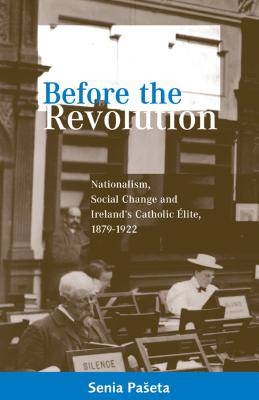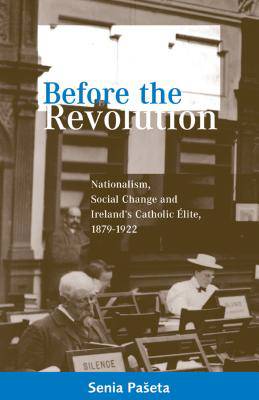
- Retrait gratuit dans votre magasin Club
- 7.000.000 titres dans notre catalogue
- Payer en toute sécurité
- Toujours un magasin près de chez vous
- Retrait gratuit dans votre magasin Club
- 7.000.0000 titres dans notre catalogue
- Payer en toute sécurité
- Toujours un magasin près de chez vous
Before the Revolution
Nationalism, Social Change and Ireland's Catholic Elite, 1879-1922
Senia Paseta
Livre broché | Anglais
53,45 €
+ 106 points
Description
Although much has been written about the impact of developing separatist thought on early twentieth century Irish politics, little is known about Ireland's last Home Rule generation whose expectations were shattered by the revolutionary events of 1916-22. Before the Revolution seeks to redress this imbalance by looking at the influence of education, employment, constitutional politics and wider political associations on the evolution of a new Catholic elite. Gender and class are two important focuses of the study. The experience of employment, membership of political and cultural associations, and the pursuit of entertainment are used to describe the development of this new stratum of modern Irish society.
This book explores the developing influence of Catholic intellectuals - both men and women - in Irish politics during the era before the First World War and the Easter Rising, using the prism of the Irish university question and the development of secondary schools. By profiling a cross-section of representative groups and associations, Paseta challenges the accepted view that Gaelicist rhetoric and 'advanced' nationalist politics predominated among politically-minded students.
This study also chronicles - for the first time - the development of self-consciously Catholic organisations in response to the pervasive idea that the professions actively discriminated against the majority religion
This book explores the developing influence of Catholic intellectuals - both men and women - in Irish politics during the era before the First World War and the Easter Rising, using the prism of the Irish university question and the development of secondary schools. By profiling a cross-section of representative groups and associations, Paseta challenges the accepted view that Gaelicist rhetoric and 'advanced' nationalist politics predominated among politically-minded students.
This study also chronicles - for the first time - the development of self-consciously Catholic organisations in response to the pervasive idea that the professions actively discriminated against the majority religion
Spécifications
Parties prenantes
- Auteur(s) :
- Editeur:
Contenu
- Nombre de pages :
- 240
- Langue:
- Anglais
Caractéristiques
- EAN:
- 9781859182277
- Date de parution :
- 30-04-99
- Format:
- Livre broché
- Format numérique:
- Trade paperback (VS)
- Dimensions :
- 141 mm x 215 mm
- Poids :
- 254 g

Les avis
Nous publions uniquement les avis qui respectent les conditions requises. Consultez nos conditions pour les avis.






